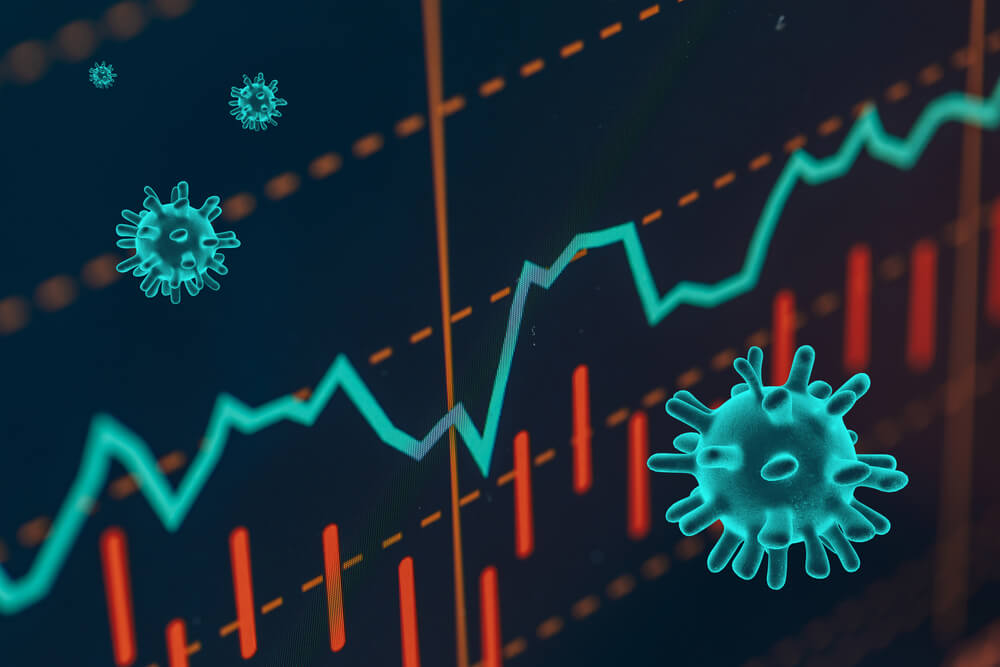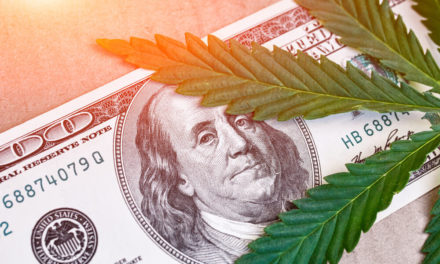If the presidential election ever comes to an end, we might have a lull in the 24-hour news cycle.
But the “other” big theme of 2020 — the COVID-19 pandemic — is about to be front and center in the headlines again.
The numbers have been creeping higher, and we’re just now entering cold and flu season. On top of that, the busy holiday season is kicking into high gear.
Charlie Bilello of Compound Capital Advisors breaks it down for us:
US COVID-19 Update:
-New positive cases*: 88,971 (new high)
-New tests*: 1,266,150 (new high)
-% Positive*: 7.0% (highest since 8/17)
-Hospitalizations: 52,049 (highest since 8/6)
-Deaths*: 922 (highest since 8/31)
*7-day Average pic.twitter.com/HDpATAKUwA— Charlie Bilello (@charliebilello) November 5, 2020
We’re now hitting an average of 88,971 new cases per day, and recently breached single-day records over 100,000.
By itself, the caseload doesn’t necessarily matter. Higher cases today can be a result of more testing, and we’ll never really know the case count from months ago when testing was still sparse.
That said, the rest of the data is also trending the wrong way. The positive result rate hit highs last seen in August, as did hospitalizations and deaths.
Being a data guy, Bilello normalized the data account for increased testing and found that the infection rate is likely at its highest levels since May 2:
My simple model that adjusts case levels for increased testing shows now shows the virus at its most prevalent level in the US since May 2. pic.twitter.com/pGn9Wn5yXZ
— Charlie Bilello (@charliebilello) November 5, 2020
So, while we’re still not at the crisis levels of the second quarter … this isn’t looking so good.
The question is, what happens next?
Political Response to COVID-19
President Trump has been reluctant to do much, due in part to his reelection efforts. He didn’t want to be blamed for the economic fallout in an election year. But now that the election is over, he no longer has these concerns.
Will Trump take a more forceful approach to contain the virus as a way of cementing his legacy? He certainly could. But I don’t think that’s likely. It’s just not his style, and it’s still unclear how much power the president would have to enforce lockdowns or other virus containment measures at the federal level.
Likewise, Joe Biden has talked a good game about containing the virus. But it’s not at all clear to me what he can do if he wins the presidency other than, perhaps, coordinate efforts between state governors.
Biden can publicly set an example and encourage people to wear masks. But given how divided the country is, I don’t know how receptive people will be to the message. And in any event, he won’t take office for months if he wins the presidential bid over Trump.
Politically, statewide lockdowns are a non-starter across most of the country. At this point, I think most governors would allow their state’s hospital system to collapse before they went into hard lockdown mode again.
All of this paints an ugly picture. But what does it mean for our investments? How will the coronavirus impact the stock market in the coming months?
I have a few takeaways.
Coronavirus Stock Market Trends
 1. We should expect a slow recovery in the travel and leisure sectors.
1. We should expect a slow recovery in the travel and leisure sectors.
Americans are traveling more. They’re braving the virus to take that little weekend getaway in the Florida Keys or the Mexican Riviera. And that’s fantastic.
But let’s get serious. Travel isn’t anywhere close to pre-pandemic levels, and even if the virus disappeared tomorrow, it would still be months or years before these sectors stabilized.
You might make money trying to buy the dip. But that’s a tough game — expect heartburn.
2. The stocks that have led all year — primarily “virus-proof” tech stocks — should continue leading.
The worse the coronavirus situation gets, the better the competitive advantage these companies have in the stock market.
No trend lasts forever, and 2020s leaders will eventually become tomorrow’s laggards. But this trend has longer to run.
3. Get used to the fact that the stock market will be divorced from the “real” economy for a long time to come.
The longer the virus rages, the tougher the economic recovery gets. But at the same time, the worse it gets on a broad scale, the better it gets for the small core of companies best positioned to navigate it.
So, no matter what comes down the pipe, there will be opportunities for us.
In the meantime, stay safe out there!
Money & Markets contributor Charles Sizemore specializes in income and retirement topics. Charles is a regular on The Bull & The Bear podcast. He is also a frequent guest on CNBC, Bloomberg and Fox Business.





